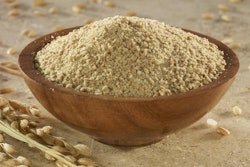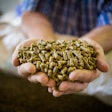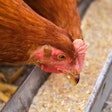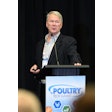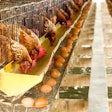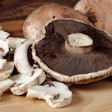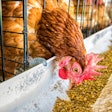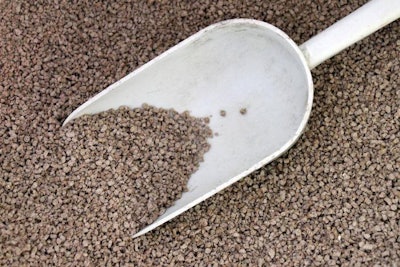
Methionine is an essential part of modern animal agriculture, but one molecule may be a better source of the amino acid than other options.
Eduardo Galo, Novus International Inc.’s area general manager for North America, explained the benefits of the HMTBa molecule. The naturally occurring molecule is a precursor to methionine and, Galo said, offers significant benefits over DL-methionine. He spoke as part of a panel discussion on the ways Novus International Inc. helps customers maximize the productivity of their flocks. The discussion took place on June 16 at Novus’ St. Charles, Missouri, headquarters as part of the company’s 25th anniversary celebration.
HMTBa, or 2-hydroxy4-(methylthio) butanoic acid, is not methionine before it is fed to an animal, but rather an organic acid. Once an animal digests the molecule, it is converted into L-methionine. Rather than being synthesized, the compound is naturally occurring. The molecule was originally developed by Novus, and is used in a number of the animal health and nutrition company’s products.
Galo explained the molecule carries a number of additional benefits beyond being a source of the amino acid animals must obtain from food. The compound contributes to gut health, because it’s an organic acid which can influence gut pH, pathogen growth and gut integrity. Additionally, it can contribute to better performance under heat stress, higher tolerance to over-feeding and additional environmental benefits.
Galo said the benefits of HMTBa were discovered as part of what he called the biggest experiment in the world. Novus looked at the performance of about 6 billion broilers in the United States for five years and discovered birds that are getting methionine from HMTBa are entering the market quicker than those getting the amino acid from DL-methionine.

Dr. Nasser Odetallah, Nouvs' executive manager for global technical services; Dr. Ajay Bhoyar, Nouvs' senior manager of global poultry marketing; and Eduardo Galo, Novus' area general manager for North America, participated on a panel focused on how Novus helps its customers maximize the performance of their animals. | Austin Alonzo
“We see things like birds on HMTBa get to market quicker versus birds fully satisfied with DL-methionine,” Galo said. “We find that birds on HMTBa have better yield, they have lower condemnations [and] they have better feed conversion.”
Novus estimates those performance advantages are worth about 6 cents a head. For those billions of birds, the advantage is worth more than $300 million to the collective broiler industry.
“We’re in this business of protecting their competitive edge, and we believe we can do that, then we can put $300 million in the pockets of our customers in addition to satisfying the reason why they bought the product to begin with,” Galo said.
Right now, HMTBa makes up 70 to 75 percent of the methionine market in the U.S. Galo said he believes that’s because the market sees the value of using the product. Novus is the largest feed additive company in the U.S. and methionine is its chief product.




